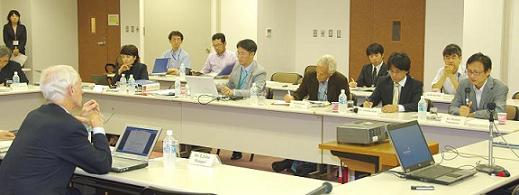Dissecting the Crises: A Study on East Asia's Political and Economic Responses
2010.09.30
Although the strong resilience of East Asian countries to the financial crises of 1997/98 and 2008/09, and the speed in which they were able to rebound from the effects surprised many, the mechanisms by which this “second East Asian miracle” was accomplished remain mostly unexplained (the first referring to the period of rapid growth from 1965-1991). Because the lessons of this rapid recovery may prove invaluable to the future viability of economic development in this region, JICA-RI has launched a research project.
The project, a collaboration of political scientists and economists, explores the institutional changes and persistence in the wake of the 1997/98 crisis, and the degree to which these changes and continuities contributed to East Asia’s recovery. Focusing on institutions, the project examines how Asian countries are becoming increasingly interconnected with the forces of globalization.
All members of the research team, including T.J. Pempel of the University of California at Berkeley and Ikuo Kume of Waseda University, gathered together at JICA-RI on September 20 for a two-day workshop to review and critique individual research progress, and to discuss future direction of study. JICA-RI Director Keiichi Tsunekawa, and Research Fellows Yasunobu Okabe and Jean-Claude Maswana, too, presented papers.
One overriding theme throughout the workshop was that Asian countries have interconnected with globalization in beneficial ways which in turn have allowed for rapid recovery from the two crises. Much discussion fell on the following issues: What were the various responses of countries to the two crises and what results were generated? Did these responses reflect national consensus, or were they contentious? Most importantly, will present factors of resilience contribute to the viability of economic development?
All individual research will be published as JICA-RI working papers by mid-2011 with plans for a book compilation in the future. By examining the resilience and viability of East Asian economies, this study will serve JICA in its reappraisal of cooperation strategy for the region. In addition, East Asian experiences in building and transforming state institutions will contribute to the renewed discussion on the role of the state in economic development in all parts of the world.
Related Research Area: Growth and Poverty Reduction


事業事前評価表(地球規模課題対応国際科学技術協力(SATREPS)).国際協力機構 地球環境部 . 防災第一チーム. 1.案件名.国 名: フィリピン共和国.

事業事前評価表(地球規模課題対応国際科学技術協力(SATREPS)).国際協力機構 地球環境部 . 防災第一チーム. 1.案件名.国 名: フィリピン共和国.

事業事前評価表(地球規模課題対応国際科学技術協力(SATREPS)).国際協力機構 地球環境部 . 防災第一チーム. 1.案件名.国 名: フィリピン共和国.

事業事前評価表(地球規模課題対応国際科学技術協力(SATREPS)).国際協力機構 地球環境部 . 防災第一チーム. 1.案件名.国 名: フィリピン共和国.

事業事前評価表(地球規模課題対応国際科学技術協力(SATREPS)).国際協力機構 地球環境部 . 防災第一チーム. 1.案件名.国 名: フィリピン共和国.
scroll